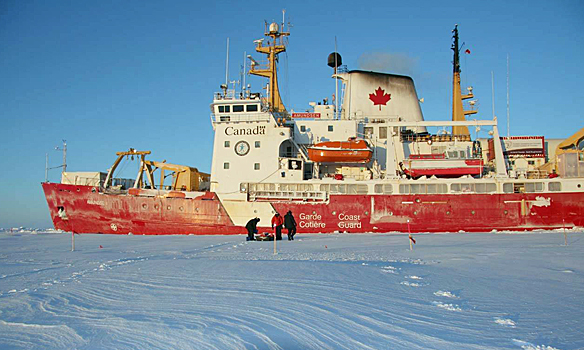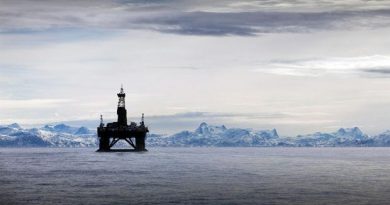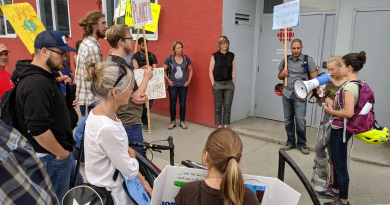Oil Companies Defend Using Canadian Coast Guard Ship
Oil industry money covers 1/3 of budget for Arctic research consortium
 BP and Imperial Oil executives appeared before a parliamentary committee Tuesday to defend the companies’ use of a coast guard ship for research that could help them drill in the Arctic.
BP and Imperial Oil executives appeared before a parliamentary committee Tuesday to defend the companies’ use of a coast guard ship for research that could help them drill in the Arctic.
The data on ocean currents, ice thickness and other topics collected for industry by the Canadian Coast Guard Ship Amundsen will benefit Canadians, said Michael Peacock, the Imperial Oil Ltd. exploration manager.
Because the information is gathered as part of a public-private partnership, it isn’t proprietary, he told the committee on fisheries and oceans. “It’s not data that Imperial Oil or BP are going to keep buried away in a basement filing cabinet,” Peacock added. “It allows us to share the data.”
Imperial Oil and BP want data about the Beaufort Sea to support submissions they will need to make if they decide to apply to drill exploration wells.
But the data can also be used by local communities, federal agencies and other scientific researchers, Peacock said.
CBC News learned in November that BP and Imperial Oil paid to use the Amundsen for a total of six weeks over the past two years.
The coast guard ship is managed by a non-profit consortium called ArcticNet, based at the University of Laval.
News of the oil companies’ involvement upset some environmentalists, since much of the ship’s mission has been to research climate change in the North. However, Louis Fortier, scientific director of ArcticNet, said the public-private partnership ensures high-quality scientific data is used to evaluate whether to drill.
No subsidies: BP
In response to questions from the committee, Peacock said the data was collected for the oil companies by ArcticNet scientists on the Amundsen — not oil and gas industry employees — while they conducted other types of research.
Anita Perry, vice-president of government and public affairs for BP Canada Inc., added that the companies do not receive any taxpayer subsidies for the work. She told the committee her company paid ArcticNet $9 million in 2010 and spent about $5.5 million on its own staff time for the collaboration.
Peacock said Imperial Oil similarly paid $11 million to ArcticNet in 2009 and also spent $5.5 million on its own staff time.
He added that oil and gas companies have public-private partnerships similar to the collaboration with ArcticNet in other countries and other parts of Canada, including Alberta.
“For me, it’s more of a normal way of increasing the amount of knowledge we can all gain in the public’s interest,” Peacock said.
BP and Imperial Oil said they were awarded exploration licences from Indian and Northern Affairs Canada in 2007 and 2008 respectively. The licences will expire in nine years.
Oil money funds new research: scientist
ArcticNet’s Fortier also appeared before the committee Tuesday. He said the money paid by the oil companies:
- Covers a “fair share” of costs to run the ship, which total $2.7 million per year.
- Pays for recapitalization of the ship as it depreciates.
- Repays past investments made by taxpayers to prepare the ship for deployment.
- Finances new research on Inuit health and education.
Fortier, a biology professor at the University of Laval, estimated that in 2009-10, a third of ArcticNet’s $20-million budget came from partnerships with oil and gas companies.
He added that in Canada, there is often criticism that the private sector does not participate enough in research and development.
“Here we have an example of a perfect match of interests and a perfect partnership between academia and the private sector and this partnership is to the [benefit] of Canadians,” he said.
Members of the committee expressed some concerns about the partnership.
Raynald Blais, Bloc-Québécois MP for Gaspésie — Îles-de-la-Madeleine, said the oil companies will eventually need to get authorization from the Fisheries and Oceans Canada to drill. In that light, he suggested the use of the Amundsen to support the application for authorization makes the relationship between the companies and the department too cozy.
Peacock responded that the companies’ relationship is with ArcticNet, not Fisheries and Oceans.
Fin Donnelly, NDP MP for New Westminster, B.C., expressed concerned about how the public perceives using a ship focused on climate change research to do groundwork for oil exploration.
Both Peacock and Fortier countered that ArcticNet’s research isn’t just focused on climate change.
In fact, Fortier said, its goal is to predict the situation in different Arctic regions five, 10 and 20 years from now to minimize negative impacts and maximize the benefits of both climate change and modernization.



